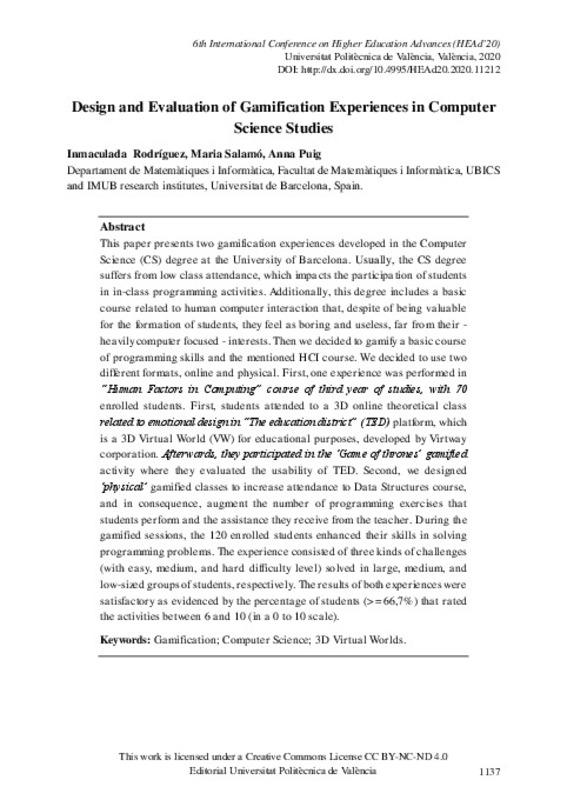JavaScript is disabled for your browser. Some features of this site may not work without it.
Buscar en RiuNet
Listar
Mi cuenta
Estadísticas
Ayuda RiuNet
Admin. UPV
Design and Evaluation of Gamification Experiences in Computer Science Studies
Mostrar el registro sencillo del ítem
Ficheros en el ítem
| dc.contributor.author | Rodríguez, Inmaculada
|
es_ES |
| dc.contributor.author | Salamó, Maria
|
es_ES |
| dc.contributor.author | Puig, Anna
|
es_ES |
| dc.date.accessioned | 2020-06-15T10:10:21Z | |
| dc.date.available | 2020-06-15T10:10:21Z | |
| dc.date.issued | 2020-05-07 | |
| dc.identifier.isbn | 9788490488119 | |
| dc.identifier.issn | 2603-5871 | |
| dc.identifier.uri | http://hdl.handle.net/10251/146370 | |
| dc.description.abstract | [EN] This paper presents two gamification experiences developed in the Computer Science (CS) degree at the University of Barcelona. Usually, the CS degree suffers from low class attendance, which impacts the participation of students in in-class programming activities. Additionally, this degree includes a basic course related to human computer interaction that, despite of being valuable for the formation of students, they feel as boring and useless, far from their - heavily computer focused - interests. Then we decided to gamify a basic course of programming skills and the mentioned HCI course. We decided to use two different formats, online and physical. First, one experience was performed in “Human Factors in Computing” course of third year of studies, with 70 enrolled students. First, students attended to a 3D online theoretical class related to emotional design in “The education district” (TED) platform, which is a 3D Virtual World (VW) for educational purposes, developed by Virtway corporation. Afterwards, they participated in the ‘Game of thrones’ gamified activity where they evaluated the usability of TED. Second, we designed ‘physical’ gamified classes to increase attendance to Data Structures course, and in consequence, augment the number of programming exercises that students perform and the assistance they receive from the teacher. During the gamified sessions, the 120 enrolled students enhanced their skills in solving programming problems. The experience consisted of three kinds of challenges (with easy, medium, and hard difficulty level) solved in large, medium, and low-sized groups of students, respectively. The results of both experiences were satisfactory as evidenced by the percentage of students (>=66,7%) that rated the activities between 6 and 10 (in a 0 to 10 scale). | es_ES |
| dc.description.sponsorship | Thanks to Virtway team, I. Dieste and M. Rodilla, and projects 2017-SGR-341, MISMISLanguage (PGC2018-096212-B-C33) and Accio COMRDI18-1-0010. | es_ES |
| dc.language | Inglés | es_ES |
| dc.publisher | Editorial Universitat Politècnica de València | es_ES |
| dc.relation.ispartof | 6th International Conference on Higher Education Advances (HEAd'20) | |
| dc.rights | Reconocimiento - No comercial - Sin obra derivada (by-nc-nd) | es_ES |
| dc.subject | Higher Education | es_ES |
| dc.subject | Learning | es_ES |
| dc.subject | Educational systems | es_ES |
| dc.subject | Teaching | es_ES |
| dc.subject | Gamification | es_ES |
| dc.subject | Computer Science | es_ES |
| dc.subject | 3D Virtual Worlds | es_ES |
| dc.title | Design and Evaluation of Gamification Experiences in Computer Science Studies | es_ES |
| dc.type | Capítulo de libro | es_ES |
| dc.type | Comunicación en congreso | es_ES |
| dc.identifier.doi | 10.4995/HEAd20.2020.11212 | |
| dc.relation.projectID | info:eu-repo/grantAgreement/Generalitat de Catalunya//COMRDI18-1-0010/ | es_ES |
| dc.relation.projectID | info:eu-repo/grantAgreement/AEI/Plan Estatal de Investigación Científica y Técnica y de Innovación 2017-2020/PGC2018-096212-B-C33/ES/DESINFORMACION Y AGRESIVIDAD EN SOCIAL MEDIA: ANALIZANDO EL LENGUAJE/ | es_ES |
| dc.rights.accessRights | Abierto | es_ES |
| dc.description.bibliographicCitation | Rodríguez, I.; Salamó, M.; Puig, A. (2020). Design and Evaluation of Gamification Experiences in Computer Science Studies. En 6th International Conference on Higher Education Advances (HEAd'20). Editorial Universitat Politècnica de València. (30-05-2020):1137-1145. https://doi.org/10.4995/HEAd20.2020.11212 | es_ES |
| dc.description.accrualMethod | OCS | es_ES |
| dc.relation.conferencename | Sixth International Conference on Higher Education Advances | es_ES |
| dc.relation.conferencedate | Junio 02-05,2020 | es_ES |
| dc.relation.conferenceplace | València, Spain | es_ES |
| dc.relation.publisherversion | http://ocs.editorial.upv.es/index.php/HEAD/HEAd20/paper/view/11212 | es_ES |
| dc.description.upvformatpinicio | 1137 | es_ES |
| dc.description.upvformatpfin | 1145 | es_ES |
| dc.type.version | info:eu-repo/semantics/publishedVersion | es_ES |
| dc.description.issue | 30-05-2020 | |
| dc.relation.pasarela | OCS\11212 | es_ES |
| dc.contributor.funder | Generalitat de Catalunya | es_ES |
| dc.contributor.funder | Agencia Estatal de Investigación | es_ES |








